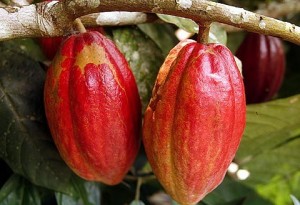SEND Ghana launches report on cocoa pricing
 SEND-GHANA, a Civil Society Organization, has launched a report on “Farmgate Pricing and Income of Cocoa Farmers”, in partnership with INKOTA netzwerk and Rainforest Alliance in Accra on Friday.
SEND-GHANA, a Civil Society Organization, has launched a report on “Farmgate Pricing and Income of Cocoa Farmers”, in partnership with INKOTA netzwerk and Rainforest Alliance in Accra on Friday.
The report presents a sampled analytical study of farmers’ perceptions on cocoa producer prices, cocoa farmers welfare and income diversification activities in Ghana, of about 220 farms across the length and breadth of the Agona East District.
Mrs Evelyn Bahn, Senior Project Manager, INKOTA netzwerk, Germany in her keynote address said the producer price of cocoa was a crucial factor to improve the livelihoods of cocoa farmers.
She said the current world market of cocoa price, which had fallen by 30 per cent since 2016, made it difficult to see a sudden increase in the price of the cash crop.
Mrs Bahn said European chocolate industries, together with the government, should see it as a shared responsibility and play their respective roles to ensure that cocoa farmers received a decent price for cocoa beans produced.
She said to have a sustainable cocoa sector, the farmer needed to be empowered, being the most important stakeholder in the value chain.
“We must all work together to implement the recommendations presented by the study” she said.
Professor Kwabena Asomanin Anaman, Professor of Economics at the University of Ghana and Lead Researcher of the report said the study was based on four main objectives, which identifies the key players in the cocoa industry involved in the determination and setting of Cocoa producer prices.
Secondly, to ascertain the impact of Ghana Cocoa Board’s (COCOBOD) mass spraying and fertilizers distribution programmes on welfare of cocoa farmers, to investigate the economic welfare of cocoa farmers and to establish the factors influencing income diversification activities of cocoa farmers, especially through off farm income resources.
He said according to the research conducted in July and August 2018, most farmers perceived that Cocoa prices were determined by the government of Ghana and the COCOBOD, farmers also perceived adjustment of weighing scales by purchasing Clarks.
The Professor said female cocoa farmers were more likely to be excluded from the mass spraying exercise than other cocoa farmers, who were mostly richer and better resourced.
He said the analysis also suggested that, increasing formal educational attainment of farmers helped to increase income diversity and better livelihood for such farmers.
Mr Anaman recommended that the COCOBOD should strengthen its public education on the process involved in the determination of local cocoa producer prices, the mass spraying and fertilizer distribution programmes.
He further recommended that the COCOBOD and its related agencies should ensure equal distribution of resources and services for all cocoa farmers, as well as increased quality and quantity of services.
Mr George Osei-Bimpeh, Country Director, SEND GHANA, said that the research, finding and recommendations given in the report must be used as a guide line to assist other cocoa growing communities and not only focusing on the area used in the case study.
He said in order to win the battle in the industry it was needful that stakeholders worked in partnership with each other.
“Let’s make farming a decent job to help eradicate the immersed problem of unemployment facing our country, there are many job opportunities in the agriculture sector and this can be improved through our collective efforts as partners,” he said.
Source: GNA
